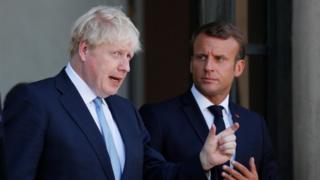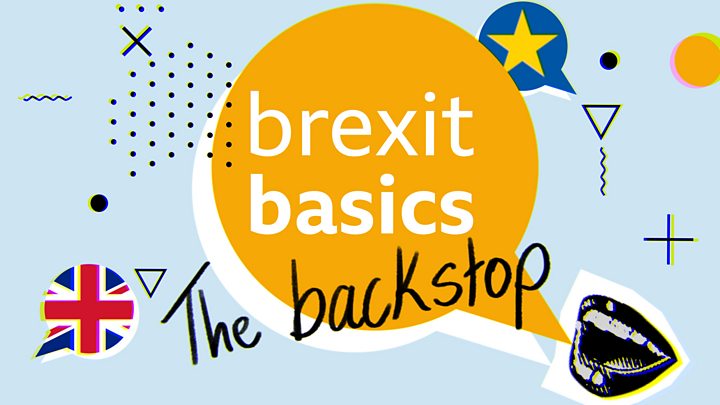 Image copyright
Reuters
Image copyright
Reuters
The EU will decide at the end of the week whether a Brexit deal is going to be possible, French President Emmanuel Macron has told Boris Johnson.
He said talks should proceed swiftly in coming days to see if anything can be agreed that "respects" EU principles.
Mr Johnson, who set out his proposals last week, says the EU should not be "lured" into thinking there will be a delay to Brexit on 31 October.
However, a law requires him to request one if no deal is agreed by 19 October.
As part of a weekend talking to EU leaders, the UK prime minister told Mr Macron over the phone that he believes a deal can be achieved, but that the EU must match compromises made by the UK.
An Elysee official said: "The President told [Mr Johnson] that the negotiations should continue swiftly with Michel Barnier's team in coming days, in order to evaluate at the end of the week whether a deal is possible that respects European Union principles."
The comments come ahead of a crunch few days of negotiations as both parties try to find a new agreement in time for a summit of European leaders on 17 and 18 October.
On Monday, Mr Johnson's Europe adviser, David Frost, will hold further discussions with the European Commission, while Brexit Secretary Stephen Barclay will visit EU capitals.
Arrangements for preventing a hard border on the island of Ireland continue to be a sticking point, with the EU calling for "fundamental changes" to the UK's latest proposals.
A senior Number 10 source said: "The UK has made a big, important offer but it's time for the Commission to show a willingness to compromise too. If not the UK will leave with no deal."
Under the Benn Act, passed last month, the prime minister must write to the EU requesting a Brexit extension if no deal is signed off by Parliament by 19 October, unless MPs agree to a no-deal Brexit.
Government papers submitted to a Scottish court said that Mr Johnson will comply, despite his assertion that there will be "no more dither or delay".
The No 10 source called the legislation a "surrender act" and said its authors were "undermining negotiations".
"If EU leaders are betting that it will prevent no deal, that would be a historic misunderstanding," they said.
Analysis
By Iain Watson, political correspondent
It's good to talk.
But was there a meeting of minds between the prime minister and the French president?
Boris Johnson's aim was to disavow President Macron of any suspicion that parliament simply wouldn't allow the UK to leave the EU at the end of the month without a deal.
So this really could be the 'final opportunity' to seal one.
The prime minister will deliver a similar message to other EU leaders.
So far, though, Mr Johnson's proposals are yet to open the door to more intensive negotiations.
From the Elysee Palace's account of the call, Macron's message to the PM seemed to be: First, work through the EU negotiator, Michel Barnier - don't work on individual leaders.
And second, if you don't move a bit more towards the EU's position by the end of the week, then it's no deal.
So far, then, any talks seem to resemble the denouement of Reservoir Dogs - more stand-off than mutual understanding.
Mr Johnson has claimed his plans have gained support in Parliament.
Writing in the Sun on Sunday and the Sunday Express, he said his untested plan to use technology to eliminate customs border checks would take the UK out of EU trade rules while respecting the Northern Ireland peace process.
"I say to our European friends: grasp the opportunity our new proposal provides. Join us at the negotiating table in a spirit of compromise and co-operation," he said.
He claimed MPs from "every wing of the Conservative Party", Northern Ireland's Democratic Unionist Party and from Labour have said "our proposed deal looks like one they can get behind".
Earlier, Irish Prime Minister Leo Varadkar said he believed a deal was possible but said the current proposals could not yet "form the basis for deeper negotiations".
Meanwhile, speaking on the BBC's Andrew Marr Show, Brexit Secretary Stephen Barclay said talks were under way with Labour and other opposition MPs aimed at securing their support for a new deal.
He said ministers were "considering" the idea of putting the PM's proposals to a vote in Parliament to test support for them ahead of the EU summit.
What are the PM's border plans?
Under Mr Johnson's proposals, which he calls a "broad landing zone" for a new deal with the EU:
- Northern Ireland would leave the EU's customs union alongside the rest of the UK, at the start of 2021
- But Northern Ireland would continue to apply EU legislation relating to agricultural and other products, if the Northern Ireland Assembly approves
- This arrangement could, in theory, continue indefinitely, but the consent of Northern Ireland's politicians would have to be sought every four years
- Customs checks on goods traded between the UK and EU would be "decentralised", with paperwork submitted electronically and only a "very small number" of physical checks
- These checks should take place away from the border itself, at business premises or at "other points in the supply chain"
Also on the Andrew Marr show, Shadow Attorney General Shami Chakrabarti said the prime minister "speaks with forked tongue" on the possibility of asking for an extension, adding he "seems to think he is above the law".
She insisted there were no loopholes in the legislation, adding that the conditions under which the PM must ask for another Brexit delay were "explicit and specific".

Media playback is unsupported on your device
